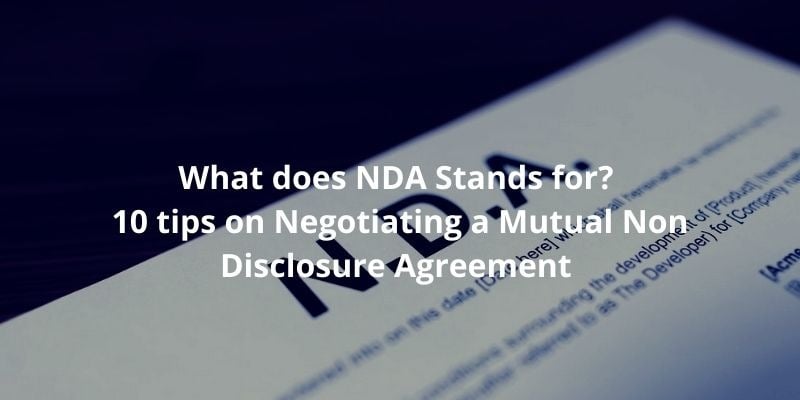What does NDA Stands for? 10 tips on Negotiating a Mutual Non Disclosure Agreement
21 May 2025
14 Nov 2021
min read

What is n d a meaning ?
N D A meaning is Non-Disclosure Agreement, also known as Confidentiality Agreement.
So, nda means what - it is a legal document to create obligations of confidentiality when one party disclose business plans, trade secrets or other proprietary information to another.
What is N d a meaning in business?
Understanding the n d a meaning is essential parties are planning to enter into a business relationship with each other, such as joint venture, sale and purchase transactions, investment, manufacturing, distribution, consultancy or employment relationships. This is because parties engaging in a business relationship may share information that is confidential to their respective business, and if disclosed can lead to loss of profit or reputation.
So, nda means what in a business? Every business collaboration is often initiated with a NDA, and to speed up the process business owners require a ready to use nda template that takes care of the risk involved with disclosing confidential information.
What is the purpose of an NDA?
Primary purpose of NDA is to ensure confidential information is kept a secret by the parties involved.Examples of confidential information include marketing strategies, financial data, pricing details, trade secrets etc.
NDA template will:
(a) Identify what information is confidential;
(b) Identify what information is not confidential
(c) include binding obligations for parties to keep the information, identified as confidential, a secret.
What happens if you break an NDA?
If one party breaches the NDA then it is important to check for the remedies for breach in the NDA signed by the parties. Often NDA provides for monetary damages or injunctive relief in case of breach.
- Monetary Damages for Breach of NDA: The breaching party will be required to compensate the wronged party for losses (e.g. loss of profir, reputation) resulting from disclosure of confidential information.
- Injunctive Relief: The Court orders the breaching party to stop any further disclosure or misuse of confidential information. This is an important remedy when breach involves disclosure of trade secrets, patent applications etc.
How long do NDA's last?
NDA's last for the duration agreed by the parties in the agreement. NDA template can be categorized based on duration as follows:
- Short term NDA (weeks to months) and are used generally during negotiations, preliminary discussions before finalizing a project or collaboration.
- Medium term NDA ( few years ) and are used to protect information that needs to kept confidential for few years but not indefinitely
- NDA with no expiration date are suitable for transactions that involve disclosure of trade secrets, however, the enforceability of such NDA's vary by jurisdiction.
Can you sign an NDA as an individual not a company?
NDA is simply a contract and can be signed by an individual. For example, a sole proprietor can sign the NDA as an individual, and such individual will be personally responsible for breach of the NDA.
Understanding the n d a meaning: Difference between a Unilateral NDA and Mutual NDA (including NDA Template)
There are two main types of NDAs to understand when exploring the n d a meaning:
(i) unilateral NDA (one way); and
(ii) mutual NDA (both ways).
In relation to an investment or sale and purchase transaction, where the company discloses information to the potential buyer/investor, typically, a one-way NDA is used. In situations where two or more parties are planning to enter into a business relationship or a joint venture, each party may disclose its own confidential information to one another, and a mutual NDA will be executed.
Unilateral NDA Template
Unilateral NDA, central to the n d a meaning, is usually drafted from the point of view of the disclosing party who will be negotiating with a buyer/investor. Another example is an employer asking new employees to sign unilateral a one-way NDA. This document tends to be one-sided and should be carefully negotiated.
NDA template : Examples of unilateral NDA or one way NDA are as follow:
- Unilateral NDA for the transaction
- Unilateral NDA for business
- Unilateral NDA from employer to employee
Mutual NDA template
In the context of n d a meaning, a mutual NDA template is generally drafted in a more balanced manner.
That said, one should ensure that the terms are fair and reasonable in a mutual NDA, given one party may disclose more proprietary information than another.
NDA template: Examples of mutual NDA are as follow:
Negotiating an NDA: Key Considerations When Understanding N D A Meaning
Here are 10 tips on negotiating a unilateral/ mutual NDA from the perspective of a recipient of information:
1. Non-disclosure obligation
When negotiating an NDA, it is important to ensure that the range of persons to whom confidential information may be disclosed (normally contained in a definition of "Authorised Recipients" or its equivalent term) is sufficiently wide to meet your needs (from the perspective of the disclose).
You may have companies/ advisers/ consultants/ employees and officers to that you need to disclose the information. You should think not only about who will need Information to initially assess the information, but also about who will need it if the business/ transaction goes ahead, for example:
- Will/may a proposal/board paper need to be given to a parent entity?
- Is it likely that various entities within the client's group will need access to the Information?
- Does the definition allow the Information to be distributed to all necessary professional advisers/financiers/investors? This is a potential area for debate.
If professional advisers do not fall within the definition of Authorised Recipients, disclosure to third parties such as another potential buyer/investors may only be agreed to by the discloser on the basis that such third party advisors enter into a separate NDA with the discloser.
Restrictions on disclosure only to "senior employees" are likely to be unacceptable, as non-executive directors, who may need to approve the transaction at the board level, may not be employees. In addition, you may need some junior employees to do the groundwork.
If disclosure is restricted to named individuals of the recipient party, this should generally be resisted on the grounds that it is impractical to operate the business within such confines. Both parties should look at the purpose of the NDA (business/transaction/investment/employment) to identify a more practical approach.
2. Definition of information and carve-outs
As with all NDAs, you should ensure that the definition of "Information" (or its equivalent term) is of sufficient narrowness. You should discuss whether the inclusion of any analyses or compilations produced by you or your advisers in the definition of "Information" could cause problems in relation to the return of Information. It may be important to distinguish these in the definition so that they can be treated differently in dealing with the return of Information.
The following are some standard carve-outs from the definition of “Information”:
- information was, is or has become lawfully available to the public otherwise than through a breach of this Agreement; or
- information was previously known to and at the free disposal of the recipient;
- information was disclosed to the recipient by a third party having the right to make that disclosure; or
- information is at any time independently developed by the recipient without the Information.
In addition, there is a standard carve out for the recipient – if the recipient is required to disclose all or part of the Information pursuant to any legal requirement of any country which has jurisdiction over either party or any governmental or quasi-governmental authority, it will be entitled to do.
Some NDA template may seek to limit the standard carve-out to the ambit of confidentiality undertakings, which permits disclosure of information required by law or regulation (by, for example, requiring prior consultation with the discloser on the proposed form and timing of the disclosure). You may not want to agree to the narrower carve-outs on the basis that you will want to be able to disclose information immediately when told to do so by the authorities. The most you can concede to make the disclosure immediately upon becoming aware that the disclosure is required, and advising the disclosing party of the circumstances in which the disclosure is alleged to be required (if legally permissible).

3. Responsibility for NDA Breach
Where an NDA template imposes responsibility on you for any breaches of the letter by your
“Authorised Recipients” or equivalent, you should decide whether to concede this (e.g. in respect of your lawyers, accountants, advisors, consultants, investors etc). You may resist taking responsibility for certain Authorised Recipients and may prefer them to sign separate agreements with the Discloser or alternatively enter into a back-to-back arrangement. The NDA should be amended accordingly.
Where the NDA template seeks to make all members of your group subject to the restrictions and obligations contained in it, this may not be acceptable on the basis that they are part of a larger group over which you have no control. An acceptable compromise may be to limit the obligation to those members who are in receipt of Information.
4. Return of information
In a typical one-way NDA template, there may be a term that requires the disclosure to return all information to the discloser should the business/ transaction not proceed. Even if your business has not been imposed with record-keeping requirements by a regulator, it may still be impractical to return all Information (e.g. including electronic data, which may already be saved on a server).
It will be necessary to ensure that there is an appropriate carve-out in the NDA to the requirement to return and destroy all Information, especially in those cases where you are required to retain it by applicable laws and regulations. For the same reasons, you may be reluctant to agree to provide a certificate that all Information has been returned or destroyed. Where this carve-out is granted, the recipient of the Information will usually be expected to continue to hold the Information retained in accordance with the terms of the NDA. Another compromise may be an agreement to use reasonable endeavours to return or destroy. It is important to have an operational understanding of n d a meaning post negotiation.
5. Exclusivity / Non-compete
Where an NDA template contains an exclusivity provision seeking to prevent you from speaking to other partners/ competitors, you should consider whether you would like to operate on the basis of "non-exclusivity" before agreeing to this provision. In relation to consultants or employees, one may include a “non-compete” clause.
Some people will be able to agree to exclusivity for their business, using Chinese Walls to separate it from the other businesses. For non-compete, you should ensure that it is fair and reasonable. If appropriate, the exclusivity/ non-compete provisions will need to be amended accordingly.
6. Communication
It is common for NDA template (particularly those issued in relation to sale and purchase transactions) to contain restrictions on whom within the discloser organisation you are entitled to contact. Where this is the case, you should check that these restrictions do not inhibit its ability to conduct the level of due diligence that it needs to carry out for the business/ transaction and ensure that the list of permitted contacts includes all those persons to whom you need to talk to.

7. Indemnity
You will need to decide whether or not you will be willing to give an indemnity in the NDA which is triggered by a breach of the confidentiality undertaking. Some people will strongly resist this and, in some cases, will be unwilling to proceed if forced to concede the point.
Where it is difficult to reach an agreement on the inclusion of an indemnity, you should discuss whether you would be happy to agree to indemnity recovery if this is labelled differently (e.g. as a "reimbursement and hold harmless" provision). Re-wording the clause may make it more acceptable for everyone. Other acceptable compromises may be that a breach has to be determined by a court before payment can be demanded, introducing an obligation to mitigate loss and the exclusion of consequential or indirect loss.
8. Warranties
Warranties under contract law are promises or guarantees that the facts given that relate to the subject matter are true and reliable. Some NDAs will seek to restrict the warranties that will be given or to deem all the Information as disclosed for the purposes of the final business agreement. Such restrictions should be deleted.
9. Other Inappropriate provisions
It is important to consider whether any of the provisions contained in the NDA are inappropriate for you and to delete these, since many NDA templates are drafted for certain specific purposes such as a joint venture or an acquisition, and not all provisions are applicable to your circumstances. For example, the NDA may prohibit the recruitment of the discloser's employees. If the discloser will not agree to the deletion of such a provision on the ground of irrelevance, carve-outs should be included such as "other than in the normal course of our recruitment process".
A similar point arises in relation to restrictions on dealings with customers or suppliers. A sensible compromise is to qualify the restriction by language such as "other than in the ordinary course of business" and to include an express acknowledgement that "ordinary course of business" may include certain actions that you would need to do.
In addition, sometimes an attempt will be made in the NDA to limit the purpose for which the Information can be used. Where the letter has been designed for a joint venture, new business or acquisition, this provision may need to be adapted accordingly.
If you are not unduly concerned regarding certain of these provisions that may be applicable for your particular circumstance, they may be useful "easy gives" when in negotiations.
10. Termination provisions
If you are the recipient of information, you should always include an end date in the NDA for the termination of their obligations under it. A three-year time limit is fairly standard. It is also important to ensure that the confidentiality undertaking ends if the proposed transaction/business/joint venture does proceed.
Where the business/transaction is aborted, the likelihood is that Information will eventually come into the public domain and/or cease to have any commercial value before any time limit expires in any event. To the extent that it does not and until it does, it is reasonable to agree to continue to keep such Information confidential on the terms of the letter.
Please note that this is a general summary of the position under common law and does not constitute legal advice. As the laws of each jurisdiction may be different, you may wish to consult your lawyer.
Keywords:

